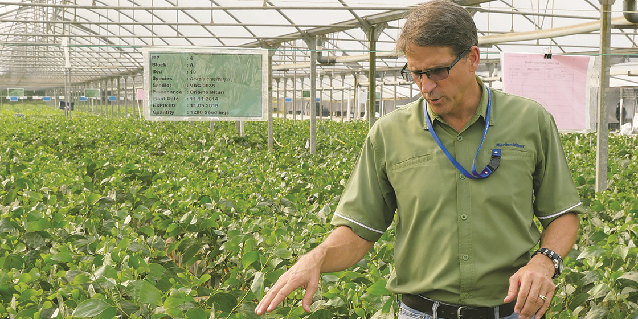APRIL Group’s Groundbreaking Paper Mill Facility
APRIL Group had a groundbreaking ceremony on May 22, 2015, for their third paper mill facility to meet increasing export demand for premium and high-value digital paper products. The ceremony...

Latest updates on what's happening in RGE Group

Tim Fenton, Deputy Head of Kerinci Central Nursery for Riau Andalan Pulp and Paper (RAPP), is a Canadian who has worked in Kerinci since 2010. His experience to-date in Indonesia spans from plantation best practice to research and development, as well as nursery.
What is your role at RAPP?
I oversee and ensure the implementation of nursery management practices and quality standards to grow the best genetic trees, in the right quantity, and at the right time as required to establish our plantations. I lead a team of 14 nurserymen, covering areas such as leaf cutting, seedling production, evaluating and correcting nursery performance trends.
Why is a nursery important for the forestry sector?
It is the first step in a forest plantation business and the future fiber source for the business that is reliant upon the output of what the nursery provides today. High quality, vigorous plants, tested for the growing environment and the business products, are required to be delivered on-schedule in order to maximize the growth for the business; this is often referred to as Species-Site Matching – a key to a successful fiber business.
What does the nursery produce?
Nursery ‘production’ refers to the volume of plants sown or set in the nursery. ‘Delivery’ refers to the nursery output of plants that meet quality standards and are shipped to plantation. On average, only 50 percent (or less) make it through the nursery process to reach the plantation. In 2015, the nursery will set or sow 1.4 million plants every day in order to meet daily delivery commitments of 700,000.
What do you do to ensure survival of these plants?
The key to success in the nursery is to know the essential growing variables and constantly monitor them to ensure suitable conditions for your crop. It is the attention to the smaller details that most often make the difference.
Changes in weather can result in outbreaks in pest and disease; a change in the pH of the irrigation water will affect the uptake of nutrients; a leaking pump seal will reduce effective line pressures resulting in inconsistent fertigation distribution. Behind the success of a strong nursery, you will often find a collection of skilled nurserymen who are constantly worrying over the smallest of details. You can never overlook the value of a good nurseryman.
What do you like about your job?
I enjoy the daily challenge of the nursery work environment. As much as we try to treat the nursery as a “tree-production” factory, we are constantly reminded that plants respond to the smallest change in their environment.
The above article is published in the Jakarta Globe on April 20, 2015. The whole feature may be viewed here.